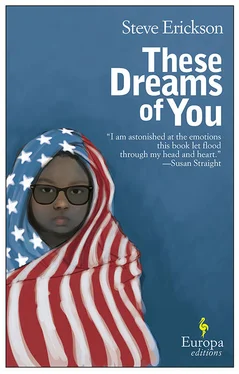“Around and about. Mostly in Los Angeles.”
“That’s where we’re from.”
“Yes,” she smiles, “I know.”
“Where’s your mother now?”
“She is no longer alive.”
“I’m sorry.”
“It happened long ago. I would like,” she says, “to go to your country someday. Especially now. Now it must be a very exciting place.”
The weather outside has cleared and Zan suggests a walk. The four circle the small park across the street from the hotel, which is part of a crescent of small hotels. “It’s hard getting them out of the room,” Zan explains to Molly; they all sit on a bench, Parker and Sheba fighting over a Game Boy. Zan says, “Let’s do this. I’m taking the children with me to the university tomorrow. James is going with us. Why don’t you come as well? See how it goes.”
“She’s going through your purse,” Parker says to Molly about Sheba. Molly ignores it. “James?” she says to Zan.
“Sorry,” Zan scoffs, “Mister J. Willkie Brown, as he prefers the world to know him. Of course I’ll pay you for the time. What’s your rate?”
“What do you think is fair?” she says.
He tries to calculate currency exchange. “Ten pounds an hour?” It’s more than he can afford — these days anything is more than he can afford — but he doesn’t want to be the foreigner exploiting a black woman in her country, or more her country than his, anyway.
Parker says to Molly, “She’ll break that camera.” Sheba looks at her brother and draws a finger across her throat. “Sheba,” Zan says to the girl, who’s pulled a small camera from Molly’s purse, “that’s not yours.”
“I don’t mind,” says Molly.
“Thank you, that’s nice of you,” Zan says, “but she can’t think it’s O.K. to go through other people’s things.”
“She broke Viv’s camera,” says Parker.
“SHUT UP, PARKER!” Sheba says.
“Mom was pissed off,” says the boy. He adds, “That’s a really old-school camera.” This is the first time Zan has heard his son say “pissed.” Also, if he had nothing else to think about, he would monitor the occasions when Viv is “Mom” and when Zan is “Dad”—an excavation of Parker’s references and forms of address. Sheba attacks the button on the camera. “Stop it,” Zan says and takes the camera, handing it to Molly. “It’s an old-school camera,” Sheba says, mimicking her brother.
“I have had it since I was a little girl,” says Molly, “about your age.” Parker is trying to fathom cameras existing that far back in time. “It’s a ghost camera,” Molly smiles, bending down to Sheba. “Oooh.”
“That’s not scary,” the four-year-old informs the woman. “What’s a ghost camera?”
“It means,” says the woman, leaning into her explanation to make it sound as mysterious as possible, “that sometimes you take a picture but a minute later when you pull out the film, it has disappeared.”
“I think,” Parker says, “that’s another name for a camera that doesn’t work.”
Zan shoots his son a look. “I’ll phone you tonight,” he says to the woman, “and we’ll make tomorrow’s arrangements.”
“I’m afraid I don’t have a mobile,” says Molly.
“Of course. You said.”
“I assume you take the train from Waterloo Station.”
“I think that’s right.”
“Shall I come by the hotel or meet you at Waterloo then?”
“You suck,” Parker says to Sheba.
“I hate you!” Sheba answers before turning her attention back to Molly. Zan says wearily to the woman, “At eleven at Waterloo,” instead of what he was about to say, which was, I’m sure the kids are going to love you.
As Molly disappears down the road from Cartwright Gardens, Sheba watches her as intently as she did from the pub window. Zan waits to see if the woman looks back and convinces himself that at one point she’s paused, for the slightest of moments, summoning the will to stare straight ahead.
She’s pretty, more round than heavy, and has some of the extraterrestrial features of Ethiopians. She doesn’t look anything like Sheba who, Zan remembers, takes after her handsome father. Perhaps the very strange thought that will grow stranger and bigger in his head never would have occurred to him if he and the children hadn’t seen her outside the pub, returning the girl’s watch with her own, or if she hadn’t told him where she was born. “Good lord,” he can hear Viv exclaiming in front of the laptop a few weeks ago, staring at her email. “Czechoslovakia or Poland or Germany?”
All of his life Zan has made an aesthetic out of coincidence. In part it’s the very unlikeliness of this young woman, who’s not quite here and not quite there, not quite this and not quite that, that makes what Zan thinks and feels not only possible to him but nearly inescapable. It would be so utterly in keeping with the late tenor of their lives, with the way the stars have aligned so mischievously since Sheba’s arrival, with the feeling that these last two years the universe has been putting them to a test, setting Viv off on some misbegotten journey to find an answer that in fact finds them. But more than anything, what keeps yanking Zan back from both sleep and reason that night, as his mind struggles to find both, is the music that Molly made when she came in the room. As when Sheba arrived in the canyon, the woman was filled with songs, snatches of them, few belonging to her — as if any music belongs to anyone — with the room turned into a receiver, tuned between stations, Sheba at one end of the dial and Molly at the other.
The lead character in Zan’s novel still doesn’t have a name. Almost in petulance but hardly to be mysterious, Zan marks the character with an X, as though he’s a spot on a map. If Zan were writing with a quill, he imagines slashing the parchment.
Having been pummeled and beaten nearly eighty years into the past to the spring of 1919, X manages to get himself a tiny cabin on a cross-Atlantic ocean liner sailing from Le Havre to New York. His only company is the battered paperback copy, mysteriously dropped by his body, of a novel that won’t be published for another three years.
There are amenities of the future that X misses — music, most of all — but otherwise he feels little sense of loss. Halfway in his voyage, at the longitude of thirty-three and a third, he wanders the decks of the ship, mulling how whatever chance he ever had of becoming a great novelist in the Nineties now is gone, when the epiphany hits him.
He stares at the paperback and rushes back to his cabin where, at a small table before the porthole, he begins to copy the words in his own hand (oh yes, definitely his own hand). When the ship’s captain lends him a typewriter, X calculates that if he copies even just five pages a day, he’ll finish by the fall, more than two years before the book is published.
It doesn’t take long for X to realize, of course, that once he finishes this book, the entire future of Twentieth Century literature — from massive tomes about tubercular patients in German mountaintop sanatoria before World War I to gripping epics of the Spanish Civil War, with Gary Cooperish saboteurs boinking seductive latina guerrillas — is at his fingertips, waiting to be rewritten. He lies in his bunk at night staring at the dark ceiling, listening to the waves outside the portal crash against the ship: I will be the greatest genius of all time.
“The Novel,” Zan begins his address to the University of London seminar, “as a Literary Form Facing Obsolescence in the Twenty-First Century. Or, the Evolution of History to Pure Fiction, which at least is where we’ll begin. The novel is born in a series of rewrites,” and behind him is a blowup of the image from the television report of the new president with the word ANTICHRIST underneath. The university must already want back its £3,500, Zan wonders soberly; he looks out at sixty or seventy students not including Parker, for whom spending time with his sister has become so unacceptable that he prefers listening to his father’s drone. Somewhere outside the hall, Zan hears a shriek that he knows is Sheba, somewhere else in the building with the new nanny. Parker looks toward the sound too, then at Zan, where son and father catch each other’s eye and the boy smiles.
Читать дальше











